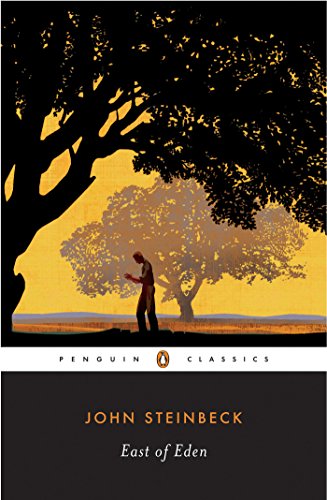All Nonfiction
- Bullying
- Books
- Academic
- Author Interviews
- Celebrity interviews
- College Articles
- College Essays
- Educator of the Year
- Heroes
- Interviews
- Memoir
- Personal Experience
- Sports
- Travel & Culture
All Opinions
- Bullying
- Current Events / Politics
- Discrimination
- Drugs / Alcohol / Smoking
- Entertainment / Celebrities
- Environment
- Love / Relationships
- Movies / Music / TV
- Pop Culture / Trends
- School / College
- Social Issues / Civics
- Spirituality / Religion
- Sports / Hobbies
All Hot Topics
- Bullying
- Community Service
- Environment
- Health
- Letters to the Editor
- Pride & Prejudice
- What Matters
- Back
Summer Guide
- Program Links
- Program Reviews
- Back
College Guide
- College Links
- College Reviews
- College Essays
- College Articles
- Back
East of Eden by John Steinbeck
First published in 1952, John Steinbeck’s East of Eden was considered to be the author’s magnum opus. Set in the luxuriant and hardy Salinas Valley, California, the primordial contest between good and evil is retold in a stirring, expository focus on paternal rejection and the freedom to overcome evil. When Adam Trask moves to the Salinas Valley with his pregnant wife, Cathy, he befriends Samuel Hamilton, a meditative Irish settler known for his indigent dignity. Unbeknownst to Adam, Cathy, whom he thought consummately angelic, was actually a prostitute who had committed murder and slept with his brother. His chimera of her munificence is broken subsequent to the births of his twin sons, whereupon Cathy violently leaves him and breaks Adam’s heart.
It is Samuel who discerns the hedonism in Adam’s depression and helps his friend reconcile his life, a key instigator to Adam’s salvation. As the twins grow older, christened Cal and Aron, Aron manifests his father’s good heart, whereas Cal exhibits his mother’s antagonism and tendency to manipulate; however, by adolescence, the cosseted Aron turns toward religion to protect himself from corruption and Cal, misunderstood and disliked, struggles to combat his bad blood and prays to God to be more like Aron. Adam’s nepotism toward Aron has a deleterious effect on Cal, who adores his father and craves for his affection. Aware of his mother’s nature, Cal fears that he will turn into Cathy, for he understands what makes her so “mean”; similarly, Aron has difficulty bearing with the all-pervading human evil in the world, seeking hollow shelters to elude confrontation with this evil.
The book culminates to the significance of the Hebrew word timshel—“Thou mayest”—which gives one a great choice whether to let sin rule over one or to rule over sin. The discussion between the characters probe the veracity of will, “for if ‘Thou mayest’—it is also true that ‘Thou mayest not’” (Steinbeck 301). While Cal’s ultimate mistake besets him with guilt, timshel is a relic of his freewill; moreover, it is a choice of whether to allow that guilt to have power over him—or not. I had an especial regard for this part of the book, for the autonomy of choosing one’s own moral destiny resonates with my belief that our lives are our own and that the legacy of our antecedents do not define our fates. Stimulating and poignant, East of Eden was a book that I verily enjoyed. John Steinbeck’s earthy style of writing impels the plot with unambiguous and evocative detail, a little verbose, but powerful nonetheless, making it a commendable option for readers of all ages and levels of sophistication.
Similar Articles
JOIN THE DISCUSSION
This article has 0 comments.

